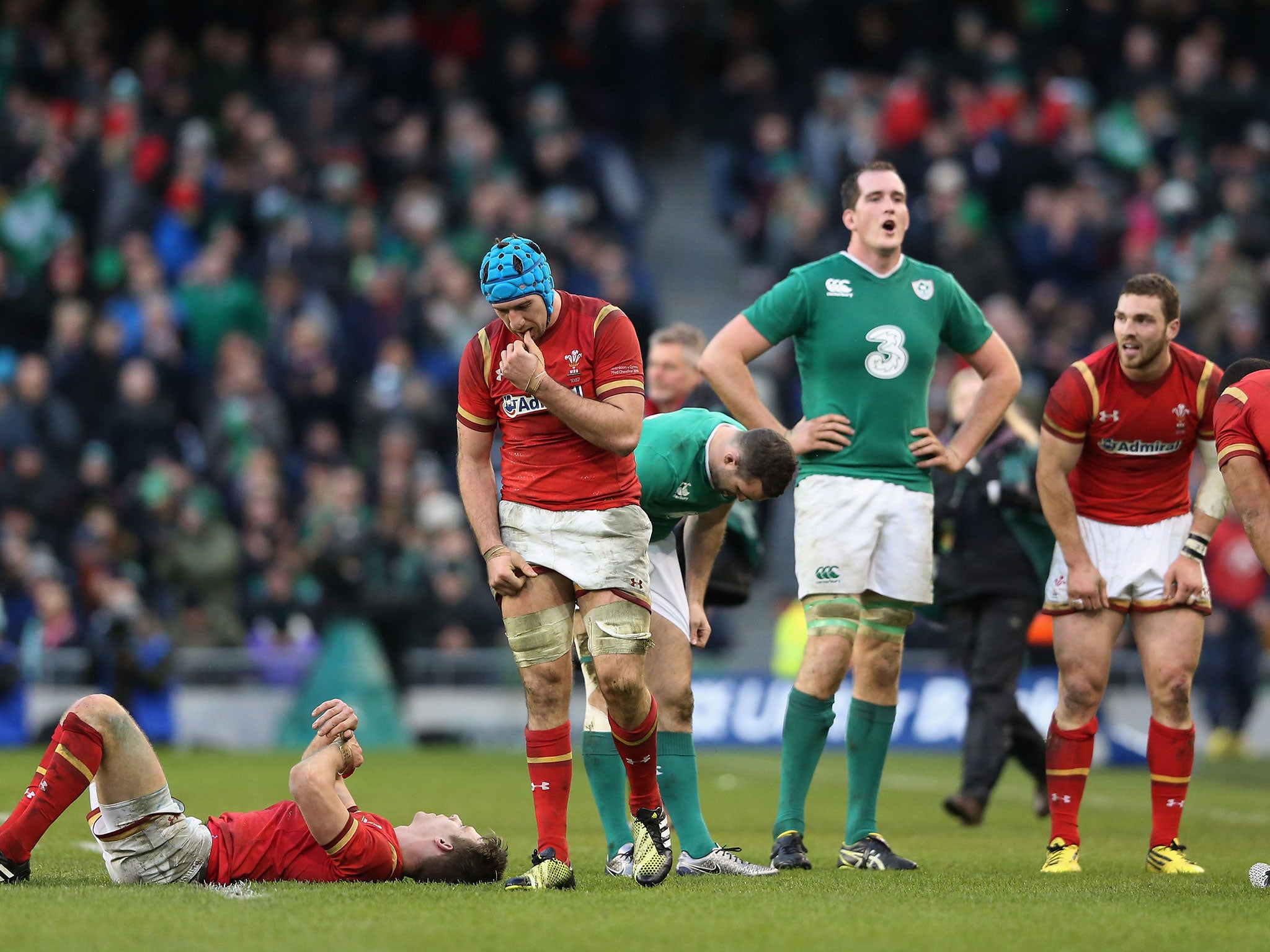Ireland vs Wales match report: Honours even as Johnny Sexton equalises at the death
Ireland 16 Wales 16

How Warren Gatland and Joe Schmidt review yesterday’s absorbing match in Dublin depends on whether the glass is half full or half empty, but the draw was undoubtedly a missed opportunity for both.
Ireland, the defending Six Nations champions, must look at how they managed to allow a 13-point lead be whittled away until Jonny Sexton’s equaliser six minutes from time saved their blushes.
So much for a brave new world for Wales. Suggestions they would show a new hand proved baseless. This was the same attritional strong-arm tactics employed by Gatland for the past eight years, based upon the principle that the longer you can stay in the fight, the better your chances of winning late. And it almost worked.
As the game ground on, time ticked away and tensions rose with the scores all square, the contest descended into a wrestling match for every scrap of turf. One period of Welsh possession stretched for 28 phases yet ultimately failed to make a single metre.But after a poor start, Taulupe Faletau’s timely score cut the deficit to three points before half-time and Rhys Priestland, on early for Dan Biggar, kicked Wales into the lead seven minutes from time.
It should have been enough yet, maddeningly for Gatland and Wales, they succumbed to the classic sucker punch. Having worked their socks off to gain the lead for the first time, replacement scrum-half Lloyd Williams, only just on the pitch, horribly sliced his box kick, Wales were caught offside and Sexton levelled, thereby ending Wales’ run of winning Grand Slams the year following a World Cup.
“It’s not a loss but it has taken a few trophies out of the cabinet. We can’t win the Triple Crown or Grand Slam so now it’s about putting ourselves in with a chance to win the Championship,” said Gatland.
“We started poorly. Emotionally Ireland were better than us in the first 20 minutes and we gave away soft penalties. But good sides pick themselves up and that’s what we did. We showed some character to get back in the lead and possibly we should have come away with a win. It’s frustrating not to get an exit right.
“There was some rustiness and perhaps a draw was a reflection of the game. Both sides tried to move the ball, so that was a positive for the tournament. But it was hard to hold onto the ball in the rain. Perhaps Scotland will agree to us closing the Millennium Stadium roof next week.”
Wales are now sweating on Biggar, who hobbled off early in the day with a high ankle sprain.
Replacement Priestland blew hot and cold. He kicked his penalties and the conversion, but his fumble led to Ireland crossing and he sliced the chance to win the game with a late drop-goal attempt from in front of goal.
Gatland had already been forced to gamble on the fitness of Liam Williams. The Scarlets full-back came through his first 80 minutes since last May after Gareth Anscombe pulled out on the eve of the game with a tight hamstring.
Ireland have already suffered injuries and are likely to be without Keith Earls in France on Saturday after a knock to the head, though Sean O’Brien and Rob Kearney are likely to return.
“I feel encouraged by the performance if not the result,” said Schmidt. “Our hard work during the week showed early on and the 13-point lead was the springboard we knew we needed because they had the territory and possession in the second half. So to get those last three points makes the draw feel better than it normally would.”
Ireland were dynamic in defence, blitzing at speed and isolating Welsh ball-carriers. It was epitomised by a crucial tackle by Andrew Trimble on Alun Wyn Jones to deny Tom James a clear run to the line. Not be outdone, Jamie Roberts threw himself into the action with abandon.
Biggar had his left ankle strapped up on 13 minutes while opposite number Sexton doubled Ireland’s lead with a second penalty and then pushed his own first effort across goal. Two minutes later Biggar hobbled off in frustration and Wales’ kicking options were suddenly depleted.
Devin Toner used all his 6ft 10in frame to charge down Gareth Davies and Priestland hacked clear rather than simply touching down for a drop-out.
From the line-out Ireland’s CJ Stander, the game’s leading ball-carrier, was denied a try on his Test debut over the line. But Ireland caught Wales napping as they shifted right three times and Murray capitalised on Gareth Davies’ sluggishness to squeeze between two forwards. It summed up the gulf in class between the rival half-backs.
Wales’ back row compensated for the shortcomings. Faletau chased down Simon Zebo, Sam Warburton was quick to prevent Stander breaking clear and Justin Tipuric was tireless. However, Wales had the better chances and will be the more frustrated at not winning.
Liam Williams dropped Priestland’s cross-field kick in-goal and Scott Baldwin fumbled when they had finally manipulated a three-on-two overlap. But Samson Lee and Rob Evans were enjoying themselves in the scrums against Jack McGrath and Nathan White.
On the front foot, Faletau picked up and powered over on 38 minutes to set up a compelling second half. Wales dominated possession but grew increasingly predictable, allowing Ireland to hang on.
Join our commenting forum
Join thought-provoking conversations, follow other Independent readers and see their replies
Comments